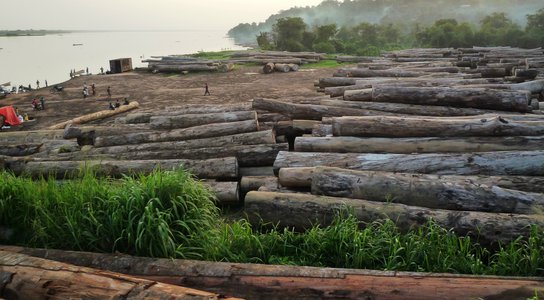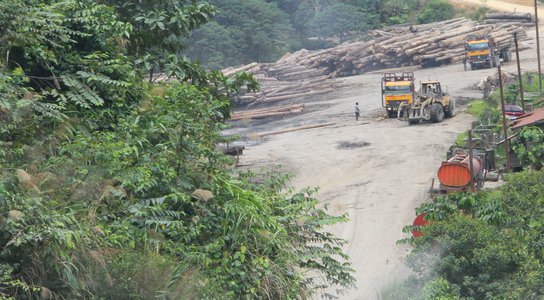Thirteen years since the launch of an EU-wide initiative aimed at tackling the global trade in illegal timber, the results of its first official evaluation are in. The European Commission’s rather optimistic take on it was “EU action on illegal logging is bearing fruit”. But take a closer look at the evaluation and the picture is much more mixed.
As countless Global Witness exposés have shown, the EU is a major destination for illegal timber. Europe is also a major donor – contributing 882.4 million euros in the first eleven years of the FLEGT (Forest Law Enforcement, Governance and Trade) Action Plan to tackle illegal logging. This means that it has the potential to make a real difference in tackling the illegal timber trade.
Some timber producing countries targeted by FLEGT have ushered in some promising reforms – aided by support in-country and the prospect of access to EU markets. In particular, the involvement of local civil society in discussions on governance of their forests and greater transparency are to be applauded.
However, significant challenges remain and this is where Global Witness believes that the EU should seize the opportunity of the evaluation to refocus its efforts.
In many timber producing countries corruption hampers meaningful reform and proper legality of the sector. Cameroon’s National Anti-Corruption Commission has gone as far as describing the inter-ministerial commission for the allocation of logging permits in Cameroon as “a well-orchestrated criminal organisation”.[1]
For the EU’s efforts to be effective, corruption must be tackled throughout the sector from corrupt decisions about who receives logging permits, to bribes to officials for certain documents. This requires high level political will from both the leadership of the producer country government and the EU, who must be brave enough to tackle vested interests and undertake difficult reforms.
There has also been a ‘lack of leadership’ when it comes to tackling conflict timber, according to the evaluation. Our 2015 exposé Blood Timber: How Europe helped fund war in Central African Republic[2] revealed how European companies were dealing with CAR logging companies that in 2013 alone paid over 3.4 million euros to armed rebels in order to carry on logging throughout the country’s war. CAR timber continued to enter Europe markets, helping bankroll a conflict that cost 5,000 lives and displaced over a million people.
The EU now should follow the advice of the evaluation by: explicitly addressing conflict timber in the FLEGT regulation or bilateral agreements (VPAs); treating it as illegal; suspending bilateral agreements and notifying Member State authorities without having to wait for UN or EC sanctions. As with other areas of the FLEGT Action Plan, proper planning and monitoring is much needed and currently deficient.
But the evaluation is wrong to shy away from concrete regulatory responses to two of the most important and controversial areas. Firstly, the increasing significance of the agribusiness sector, whose activities cause deforestation and forest degradation, and secondly the involvement of European financial investors in backing projects causing such harm, whether investing in sustainable forest management projects (in fact just subsidies for industrial logging companies) or palm oil plantations. The evaluation’s proposal for a voluntary platform to monitor investments is inadequate to regulate the effects of a multi-billion dollar industry, which could fuel the destruction of the world’s remaining forests. What is needed is robust regulations and due diligence procedures implemented from within Europe and changes to donor policies.
Another big challenge is how the EU tackles China as the world’s biggest importer and consumer of timber and wood products. Can the EU persuade China to meet the same standards of regulation? Just one example: the second largest rainforest in Africa can be found in Democratic Republic of Congo, exporting 87.1 million euros’ worth of timber at very high risk of illegality. [3] Enforcement authorities responsible for the EU Timber Regulation still have a job to do to stop flows to Europe. But over the last few years, the exports have shifted from Europe to China. The EU must use bilateral dialogue with China at all levels to stem this flow of illegal timber deforesting one of the last great virgin rainforests.
The FLEGT action plan evaluation sets the scene for the next stage of the EU’s efforts to tackle the illegal timber trade as well as newer threats to forests [4]. It’s now vital that the European Commission, Member States and the European Parliament engage with stakeholders to future-proof the EU’s forest policy so that it truly does face down the threats to the world’s green lungs.
[1] Rapport sur l’état de la lutte contre la corruption au Cameroun en 2011, CONAC, 2011.
[2] https://www.globalwitness.org/documents/18026/BLOOD_TIMBER_web.pdf
[3] https://www.globalwitness.org/documents/18008/Exporting_impunity_Eng.pdf
[4] See joint NGO briefing for more information on action required to tackle illegal logging, deforestation and forest degradation https://www.globalwitness.org/documents/18268/briefingnote_deforestation_designed.pdfFor more information please contact Jo Blackman, [email protected], +44 (0)7912 517 126


